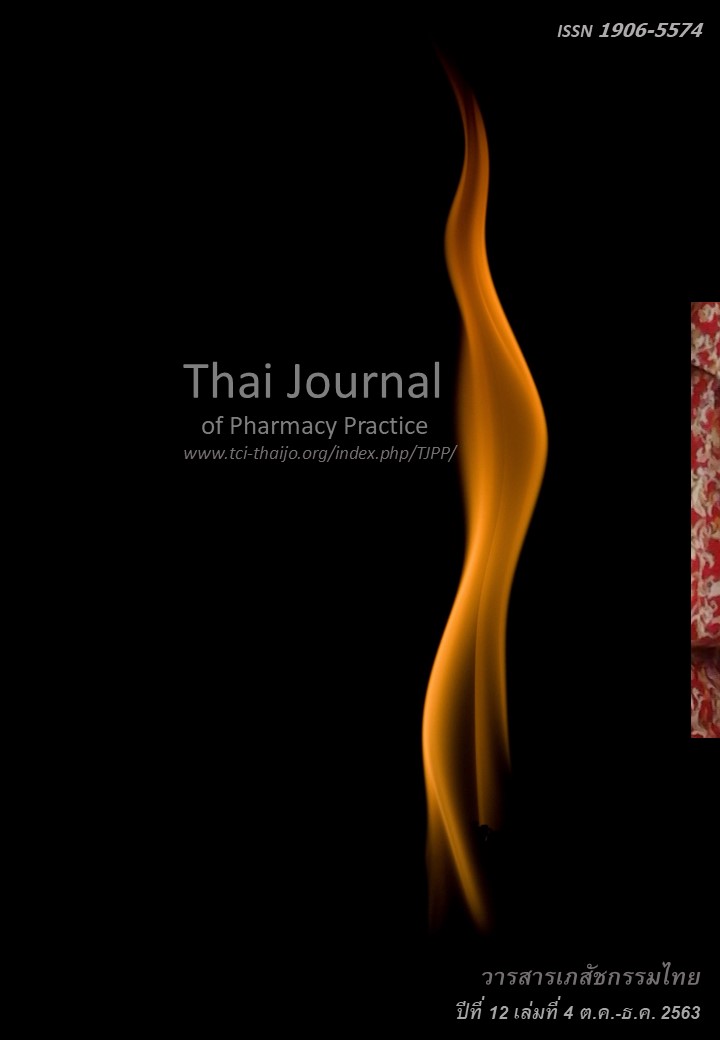ผลของการสัมภาษณ์เพื่อเสริมสร้างแรงจูงใจแบบสั้นร่วมกับการให้ความรู้และการติดตามทาง โทรศัพท์โดยเภสัชกร ในผู้ป่วยเบาหวานชนิดที่ 2: การศึกษาเชิงทดลองแบบสุ่มและมีกลุ่มควบคุม
Main Article Content
บทคัดย่อ
วัตถุประสงค์:เพื่อศึกษาผลของการสัมภาษณ์เพื่อเสริมสร้างแรงจูงใจแบบสั้น (brief motivational interviewing: BMI) ร่วมกับการให้ความรู้และการติดตามทางโทรศัพท์โดยเภสัชกร (education and telephone follow up by pharmacist: ETFP) ต่อระดับน้ำตาลในเลือดหลังอดอาหาร (fasting plasma glucose: FPG) ระดับน้ำตาลสะสมในเลือด (glycated hemoglobin: HbA1c) ความรู้เรื่องเบาหวาน ความร่วมมือในการใช้ยา การรับรู้สมรรถนะแห่งตนในการจัดการโรคเบาหวานและความพึงพอใจต่อการให้บริการโดยเภสัชกร วิธีการ: การศึกษาเป็นเชิงทดลองแบบสุ่มมีกลุ่มควบคุมและกลุ่มทดลอง ตัวอย่างเป็นผู้ป่วยเบาหวานชนิดที่ 2 ที่มี HbA1c ≥7% หรือ FPG ≥150mg/dl ติดต่อกันสองครั้งของการพบแพทย์ และมีโทรศัพท์ที่สามารถติดต่อได้ ตัวอย่างถูกสุ่มแยกเป็นกลุ่มทดลอง 58 ราย และกลุ่มควบคุม 56 ราย กลุ่มควบคุมได้รับบริการปกติของโรงพยาบาล กลุ่มทดลองได้รับ BMI แบบรายบุคคลร่วมกับการให้ความรู้จำนวน 3 ครั้งในสัปดาห์ที่ 1, 4-6, 8-10 และการโทรศัพท์ติดตามในสัปดาห์ที่ 12 ผลการวิจัย: หลังการศึกษา FPG ของกลุ่มทดลองน้อยกว่ากลุ่มควบคุมอย่างมีนัยสำคัญทางสถิติ (FPG142.3±31.1 และ 174.9±63.9 ตามลำดับ, P=0.005) ส่วน HbA1c ทั้งสองกลุ่มมีแนวโน้มลดลงแต่ไม่แตกต่างกันอย่างมีนัยสำคัญ (HbA1c 7.6±1.3 และ 7.8±1.4 ตามลำดับ, P=0.223) ความรู้เรื่องเบาหวาน ความร่วมมือในการใช้ยา การรับรู้สมรรถนะแห่งตนในการจัดการโรคเบาหวาน และความพึงพอใจของกลุ่มทดลองมากกว่ากลุ่มควบคุมอย่างมีนัยสำคัญทางสถิติ (P<0.001, P=0.001, P<0.001 และ P<0.001) สรุป: BMI ร่วมกับ ETFP ลด FPG และเพิ่มความรู้เรื่องโรคเบาหวาน ความร่วมมือในการใช้ยา การรับรู้สมรรถนะแห่งตนในการจัดการโรคเบาหวาน และความพึงพอใจต่อการให้บริการโดยเภสัชกรอย่างมีนัยสำคัญทางสถิติ
Article Details
ผลการวิจัยและความคิดเห็นที่ปรากฏในบทความถือเป็นความคิดเห็นและอยู่ในความรับผิดชอบของผู้นิพนธ์ มิใช่ความเห็นหรือความรับผิดชอบของกองบรรณาธิการ หรือคณะเภสัชศาสตร์ มหาวิทยาลัยสงขลานครินทร์ ทั้งนี้ไม่รวมความผิดพลาดอันเกิดจากการพิมพ์ บทความที่ได้รับการเผยแพร่โดยวารสารเภสัชกรรมไทยถือเป็นสิทธิ์ของวารสารฯ
เอกสารอ้างอิง
Cho NH, Shaw JE, Karuranga S, Huang Y, da Rocha Fernandes JD, Ohlrogge AW, et al. IDF Diabetes atlas: Global estimates of diabetes prevalence for 2017 and projections for 2045. Diabetes Res Clin Pract 2018; 138: 271–81.
Bureau of Non-communication Diseases. Annual report non-chronic disease 2018. Nonthaburi:Ministry of Public Health; 2018.
Diabetes Association of Thailand. Clinical practice guideline for diabetes 2017. 3rd ed. Bangkok: Romyen Media; 2017.
Jones A, Gladstone BP, Lubeck M, Lindekilde N, Upton D, Vach W. Motivational interventions in the management of HbA1c levels: A systematic review and meta-analysis. Prim Care Diabetes 2014;8:91–100.
Ekong G, Kavookjian J. Motivational interviewing and outcomes in adults with type 2 diabetes: A systematic review. Patient Educ Couns 2016; 99: 944–52.
Chrvala AC, Sherr D, Lipman RD. Diabetes self-management education for adults with type 2 diabetes mellitus: A systematic review of the effect on glycemic control. Patient Educ Couns 2016; 99: 926–43.
Song D, Xu TZ, Sun QH. Effect of motivational interviewing on self-management in patients with type 2 diabetes mellitus: A meta-analysis. Int J Nurs Sci 2014; 1: 291–7
Suratana S, Sasivimonlux K, Wichairam N, Sonkhammee P. The result of motivation theory program application on blood sugar controlling behavior of diabetic patient in Mae Kham sub-district, Mae Chan district, Chiang Rai province. Journal of the Office of Disease Prevention and Control 7 Khon Kaen 2018;25:11–9.
Kongpunt P. Effect of Health education programs based on protection motivation theory and social support on behaviors to prevent complication from kidney disease among type 2 diabetic patients. Journal of Phrapokklao Nursing College 2016; 27: 29–42.
Phimsri N, Chomnirat W. Effects of efficacy enhancement program on food consumption behaviors among patients with uncontrolled diabetes mellitus. Journal of Nursing and Health Care 2016; 3: 25–31.
Chaimol P, Lerkiatbundit S, Saengcharoen W. Effect of education by pharmacists supplemented with pictograms on the use of medications in diabetic patients. Thai Journal of Pharmacy Practice 2017; 9:476–88.
Nato S, Vannarit T, Somrarnyart M. Effect of self-management promotion through diabetic camp participation on glycemic control behaviors and hemoglobin A1C level among persons with type 2 diabetes. Nursing Journal 2016; 43: 92–104.
Sunida S. The effect of pharmacist intervention with telephone follow-up in patients with diabetes mellitus [master thesis]. Songkhla: Prince of Songkla University; 2013.
Tangkittiwat K. A causal model of HbA1c among diabetes mellitus patients in Muang district, NakhonPathom province. Journal of Prapokklao Hospital Clinical Medical Education Center. 2017; 34: 17–31.
Prochaska JO, Velicer WF. The transtheoretical model of health behavior change. Am J Health Promot 1997; 12: 38–48.
Jarustanapat P, Soivong P, Somrarnyart M. Readiness to adopt health behaviors among persons with uncontrolled type 2 diabetes mellitus. Nursing Journal 2016;3: 23–34.
Srisaket J, Chaisa P, Wanchai A. Diet consumption behavior modification patterns to control blood sugar levels of patients with diabetes in Thailand: A systematic review. EAU Heritage Journal Science and Technology 2017;11:156–70.
Lekphet J. Medication therapy management for type 2 diabetic outpatients by the pharmacist at Nongbua hospital [Clinical Pharmacy]. Bangkok: Chulalongkorn University; 2011.
Miller WR, Rollnick S. Motivation interviewing preparing people for change. New York: Guilford Press; 2002.
Krudniam S. Guidelines for developing knowledge, attitude and blood sugar controlling behaviors in patients with non-insulin dependence at Barnkoom Public Health Center, Bangban, Pharnakhon Si Ayutthaya [independent study]. Phranakhon Si Ayutthaya: Phranakhon Si Ayutthaya Rajabhat University; 2008.
Na Chiangmai E. Effects of group process on knowledge attitude and behaviors of care-giver of type 2 diabetes elders at Huay Han primary care unit Lamphun Province [master thesis]. Chiangmai: Chiangmai University; 2009.
Maneewuttigorn J. The effects of group education and counseling in diabetic outpatients by pharmacist at Pipoon Hospital Nakornsrithammarat Province [master thesis]. Chiangmai: Chiangmai University; 2008.
Wongsricha W. Application of self-efficacy program for changing health behaviors in diabetes high risk group at Nakae community hospital, Nakhonpanom Province [master thesis]. Khon Kaen: Khon Kaen University; 2011.
Phetarvut S. Factor predicting diabetes self management behavior among patients with diabetes mellitus Type 2 [master thesis]. Nakornphatom: Mahidol University; 2010.
Lohavisavapanish R. Impact of education and counseling provided by a clinical pharmacist on diabetic outpatients at King Chulalongkorn memorial hospital [master thesis]. Bangkok: Chulalongkorn University. 2003
Racic M, Katic B, Joksimovic BN and Joksimovic VR. Impact of motivational Interviewing on treatment outcomes in patients with diabetes type 2: A randomized controlled trial. J Fam Med 2015; 2: 1-6.
Pethchit R. Self care behaviors and blood sugar control among patients with diabetes mellitus at Khiensa hospital, Suratthani province. Southern College Network Journal of Nursing and Public Health 2015; 2: 15–28.
Hawkins SY. Improving glycemic control in older adults using a videophone motivational diabetes self management intervention. Res Theory Nurs Pract 2010; 24: 217–32.
Somton T. Effectiveness of health promotion program among diabetes mellitus type 2 patients in Powai primary care unit, Suratthani hospital. Region 11 Medical Journal 2016; 30:243–9.
Chia CW, Egan JM, Ferrucci L. Age-related changes in glucose metabolism, hyperglycemia, and cardiovascular risk. AHA Journal 2018; 123: 886–904.
Chalermnon W. Related factors of self care behaviors of type 2 diabetes mellitus patients in The Queen Sirikit Health Center, Khok Salung subdistrict, Phatthana Nikhom district, Lopburi province. Journal of Preventive Medicine Association of Thailand 2015; 5: 137–44.


